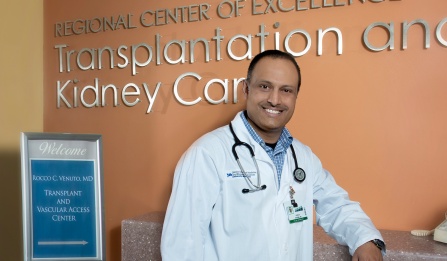Curriculum

You — like fellow Ishwor Sharma, MD — can gain key leadership experience as a trainee in our fellowship. Opportunities to teach medical students and lead renal workshops are built into our curriculum.
Our curriculum will help you fully develop your clinical care abilities, research expertise, professionalism, leadership skills and knowledge about the full spectrum of diseases and conditions you will encounter as a specialist in nephrology.
We make the quality of your training a priority: You will train in diverse clinical settings with attentive faculty and treat patients across the spectrum of renal medicine.
Our fellowship has a high board pass rate; we'll ensure that you are prepared to successfully complete your board certification examination.
First Year: Master Foundational Skills
In your first year of our fellowship, you’ll develop skills that create a solid foundation for your academic or clinical career in nephrology.
Our expert faculty will teach you to gather data and prepare a renal consult on patients with acute kidney injury, chronic kidney disease, glomerulonephritis and various acid-base and electrolyte disorders. You’ll also learn to write dialysis prescriptions for acute and chronic hemodialysis and peritonreal dialysis.
You learn how to perform kidney biopsies and place central venous catheters for dialysis. We’ll also familiarize you with continuous venovenous hemodialysis and plasmapheresis.
Second Year: Undertake More Responsibilities
In your second year of our fellowship, we’ll help you focus on working toward becoming an independent practitioner.
During the first module of the program, you’ll accompany first-year fellows on rounds at each hospital until they learn the system.
You’ll gain experience in a peritoneal dialysis clinic at our Cleve Hill Dialysis Center training site. There, our faculty will guide you as you make treatment decisions and strengthen your skills in:
- evaluating the adequacy of dialysis
- managing complications of end stage renal disease
Rotations and Electives
You will be exposed to every facet of nephrology during our two-year fellowship.
Through our rotations and electives, your training will include valuable opportunities in renal consult, inpatient renal service, transplantation and dialysis:
| First-year rotations and electives | ||
|---|---|---|
| Type | Location | Length |
| Renal consult | Erie County Medical Center | 13 weeks |
| Renal consult | Buffalo VA Medical Center | 14 weeks |
| Renal consult | Roswell Park Comprehensive Cancer Center | 9 weeks |
| Renal transplant | Erie County Medical Center | 4 weeks |
| Elective / research / dialysis | Multiple sites | 8 weeks |
| Vacation | 4 weeks | |
| Second-year rotations and electives | ||
|---|---|---|
| Type | Location | Length |
| Renal consult | Erie County Medical Center | 13 weeks |
| Renal consult | Buffalo VA Medical Center | 11 weeks |
| Renal consult | Roswell Park Comprehensive Cancer Center | 11 weeks |
| Renal transplant | Erie County Medical Center | 4 weeks |
| Elective / research / dialysis | Multiple sites | 9 weeks |
| Vacation | 4 weeks | |
Leadership and Teaching Experience
First year
During the first year of our fellowship, you’ll teach medical students while on renal consult and Med D-inpatient renal service.
Second year
We’ll expect you to teach one semester of physical diagnosis to second-year medical students during your second year.
You’ll practice your mentoring skills when you lead medical student renal workshop sessions. These workshops give you an opportunity to assert your expertise about a range of common disorders in renal medicine and gain leadership experience.
With the guidance of one of our attending physicians, you’ll be responsible for running the consultative service at the Buffalo VA Medical Center during our teaching rotation. There, we’ll ask you to teach residents, medical students and first-year fellows.
In addition, we’ll expect you to give talks at conferences, including two grand rounds presentations.
Longitudinal Care
Our fellowship enables you to attend a weekly continuity clinic where you’ll gain experience providing longitudinal care over the two-year course of the fellowship.
In our continuity clinics, you’ll increase your exposure to patients who are approaching end-stage renal disease, and you’ll learn to help them select a dialysis modality.
At our Erie County Medical Center outpatient dialysis clinic, you’ll be responsible for the longitudinal care of patients with end-stage renal disease, and you’ll undertake duties including:
- semi-monthly patient visits
- writing monthly notes
- reviewing labs
- checking adequacy of dialysis
- writing dialysis prescription and medication orders
- monthly patient care meeting
Conferences and Rounds
Our fellowship enables you to participate in meetings and lectures that contextualize and build on the core of your training.
Our conferences and rounds help ground you in areas including:
- renal transplantation
- the latest treatment protocols for renal diseases
- renal biopsies
- the use of patient data to identify renal problems
- cutting-edge research and current literature
- various dialysis modalities
Director’s Welcome
Choosing the Right Fellowship
Upcoming Events
No events scheduled.

